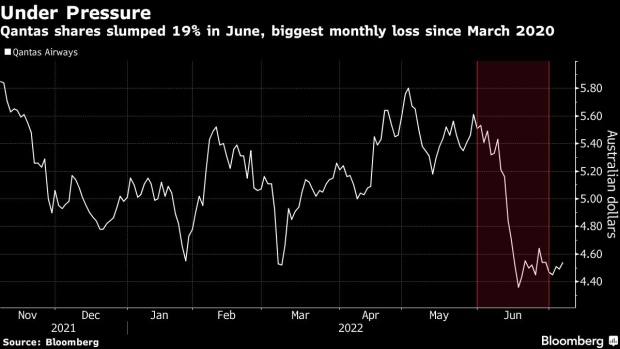Jul 6, 2022
Travel Chaos Pits Pandemic Winner Qantas Against Angry Aussies
, Bloomberg News

(Bloomberg) -- Australians are turning on Qantas Airways Ltd. and its boss as widespread travel disruptions and airport ordeals test their affection for one of the country’s biggest brands.
Qantas, which carries the slogan “Spirit of Australia,” has become a punching bag for passengers exasperated with canceled flights, lost belongings and unscheduled sleepovers on airport floors. It’s an ugly reversal of fortune for a company that carefully navigated Covid-19 and emerged in better financial shape than almost any other airline in the world.
The backlash comes as the global aviation industry struggles to cope with a rebound in travel demand after laying off staff to get through the pandemic with bare-bones operations. While chaotic scenes at airports in the US and Europe have become commonplace, emotions are running particularly high for Australians who feel let down by Qantas.
Chief Executive Officer Alan Joyce has landed in the firing line of social-media vitriol, with customers lashing out and accusing him of being overzealous in shedding more than 8,000 jobs, leaving Qantas so short of manpower that it can’t function properly.
Qantas had Australia’s worst flight-cancellation record in May, scrapping 7.6% of its services, or one in 13. It’s even become the subject of an online parody by national broadcaster ABC.
The operational lapses are pushing some disaffected passengers to Virgin Australia, which was on the brink of collapse in 2020 before private equity group Bain Capital stepped in. Virgin Australia canceled 5.1% of its services in May. The long-term cancellation rate in Australia is 2%.
Qantas leans heavily on advertisements that pull on the heartstrings, with tag-lines such as I Still Call Australia Home. Its recent media campaigns have dramatized emotional family reunions to encourage people to fly again.
“It feels like the brand’s breaking a number of promises,” said Paul Nelson, managing director of Sydney-based consultancy BrandMatters. “Loyal customers fall a lot further when they’ve had you on a pedestal and you haven’t met expectations.”
The operational failings place unexpected and premature pressure on Joyce, who took the Qantas helm in 2008 and is one of aviation’s longest-serving leaders. At the height of the Covid crisis in June 2020, with Australia essentially off limits to international travel, he agreed to stay at the airline for at least another three years to oversee a recovery.
“The longer Alan sits there, it gets more difficult for him to demonstrate that things are going to be different,” Nelson said.
Rusty Passengers
Joyce didn’t help matters in April when he said delays were partly because rusty passengers had forgotten airport security protocols and weren’t “match fit.”
Graeme Breen is one frequent flyer Qantas is losing. The schoolteacher’s attempt in April to catch a lunchtime Qantas flight from Canberra to Brisbane, a trip of about 1 hour 40 minutes, turned into an eight-hour marathon. The service was delayed at least three times at the gate before being scrubbed. Breen was diverted to Sydney for a connecting flight north to Brisbane. When he eventually got there, his luggage was still in Canberra.
“It’s definitely dented my confidence in the reliability of the airline,” said Breen. The 57-year-old gained the impression that Qantas puts profit over customer service and he booked his next trip, in October, with Virgin Australia.
In the early evening of July 3, a three-hour Qantas flight from Sydney to Wellington in New Zealand was so late leaving it missed the 1 a.m. landing curfew at its destination. It diverted to Christchurch in the middle of the night. Passengers, some of whom slept on a bench in the airport, didn’t leave for Wellington until the following morning.
Ryan Walkinshaw, director of Melbourne-based motor-racing team Walkinshaw Andretti United, has kept a log on Twitter of his weeks-long effort to be reunited with his luggage. Qantas finally returned the remains of his suitcase, last seen at London’s Heathrow Airport in mid-June, this week.
Qantas has said it is taking steps to cope better, such as rolling out new check-in and baggage kiosks in Sydney. It has even called up hundreds of head-office staff to track down luggage and manage queues. The airline’s performance is “not where we need it to be,” Joyce said on June 24. “But it will improve over the next few weeks.”
Worker Woes
Some critics blame the mishaps on Qantas’s decision during the pandemic to outsource ground-handling operations with the loss of more than 2,000 jobs. A court later judged the cuts were unlawful.
The number of cabin crew at Qantas’s international division has also shrunk to about 2,000 from over 3,000 before Covid, according to Teri O’Toole, federal secretary of the Flight Attendant’s Association of Australia International.
“It’s like they’ve been caught short and they didn’t see it coming,” O’Toole said. “Their industrial relations agenda is savage and leaves no goodwill. They have to be responsible for it.”
Adding to Qantas’s woes, its engineers are threatening to strike as soon as next month as they seek a 12% pay increase. Steve Purvinas, federal secretary of the Australian Licensed Aircraft Engineers’ Association, said Qantas has 750 engineers, 30% fewer than before the pandemic, which isn’t enough to get through the required maintenance and repair work.
“The challenges Qantas is facing are all of its own doing,” Purvinas said by phone. “They’re not caused by Covid. They’re caused by management.”
©2022 Bloomberg L.P.


